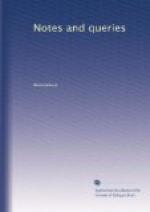NOTES.
Authorship of Henry viii.
In my last communication on the subject of Henry VIII., I referred to certain characteristic tricks of Fletcher’s style of frequent occurrence in that play, and I now beg leave to furnish you with a few instances. I wish it, however, to be understood, that I advance these merely as illustrative specimens selected at random; as there is scarcely a line of the portions of the play I assume to be Fletcher’s but would furnish some evidence to a diligent student of this writer’s style: and that, although I think each separate instance as strongly characteristic of Fletcher as it is unlike Shakspeare, it is only in their aggregate number that I insist upon their importance.
The first instance to which I call attention is the use of the substantive “one” in a manner which, though not very uncommon, is used by no writer so frequently as Fletcher. Take the following:—
“So great ones.”—Woman’s
Prize, ii. 2.
“And yet his songs are sad ones.”—Two
Noble Kinsmen, ii. 4.
and the title of the play, The False One.
Compare with these from Henry VIII.:—
“This night he make a supper,
and a great one.”—Act I. 3.
“Shrewd ones.”—“Lame
ones.”—“so great ones.”—Ibid.
“I had my trial,
And must needs say a noble one.”—Act
ii. 1.
“A wife—a true one.”—Act
iii. 1.
“They are a sweet society of fair ones.”—Act
I. 4.
Fletcher habitually uses “thousand” without the indefinite article, as in the following instances:
“Carried before ’em thousand desolations.”—False One, ii. 9.
“Offers herself in thousand safeties to you.”—Rollo, ii. 1.
“This sword shall cut thee into thousand pieces.”—Knight of Malta, IV.
2.
In Henry VIII. we have in the prologue:
“Of
thousand friends.”
“Cast thousand beams upon me.”—Act
IV. 2.
The use of the word “else” is peculiar in its position in Fletcher:—
“’Twere fit I were hang’d else.”—Rule a Wife, II.
“I were to blame else.”—Ibid.
“I’ve lost me end else.”—Act IV.
“I am wide else.”—Pilgrim, IV. 1.
In Henry VIII., the word occurs in precisely the same position:—
“Pray God he do! He’ll
never know himself, else.”—Act II.
2.
“I were malicious, else.”—Act
IV. 2.
{34} The peculiarly idiomatic expression “I take it” is of frequent occurrence in Fletcher, as witness the following:—
“This is no lining for a trench,
I take it.”—Rule a Wife, III.
“And you have land i’ th’
Indies, as I take it.”—Ibid.
IV.
“A fault without forgiveness, as
I take it.”—Pilgrim, IV. 1.
“In noble emulation (so I take it).”—Ibid.
IV. 2.




